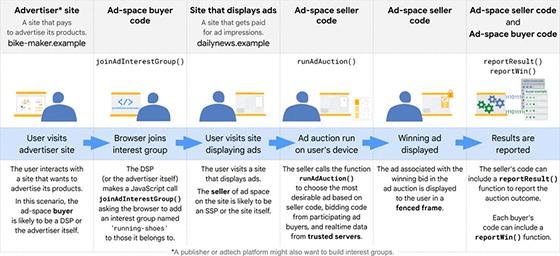
Google AdSense will begin testing FLEDGE (the First
Locally-Executed Decision over Groups Experiment) for a small percentage of traffic on or after August 28.
The company wrote in a post that it does not expect the tests to have a revenue
or performance impact on publishers. It also does not expect to see a change on how publisher controls apply. At least not for now.
Understanding user interests will become key to
understanding and enabling more relevant ads than only choosing ads based on site content, also known as contextual targeting. Or by using information that the user provided to the site that the ad
appears
FLEDGE, which relies on APIs and interest groups, is part of Google’s Privacy Sandbox proposal for targeting ads. It allows third parties to track the behavior of users in
browsers across websites.
Google provides details on how user interest groups inform ad selection as the
person visits different sites, but here is a summary.
For example, the person visits the website of a custom bike maker and spends some time online viewing different bike models. Later that
day, the user visits a news website and is shown an ad for a new bike from the bike maker it visited earlier that day.
If the person visits the website of a custom bike maker, also the
advertiser, and spends some time on the product page for a handmade steel bike. This provides the bike maker with an opportunity to target an ad. Then the advertisers demand-side platform (DSP) asks
the browser to add an interest group.
In this example, the group might be named custom-bikes. The interest group owner is an ad-space buyer in the ad auction. The owner provides
configuration information to enable the browser to access bidding code, ad code, and realtime data for the group when an ad auction is run.
An ad auction, eventually, is run on the user's
device in the browser to select a specific ad on the publisher’s site. The code to run the auction is likely to be provided by the publisher site's supply-side platform (SSP) or by the
site itself.
On July 27, Google said it would delay the deprecation of browser cookies -- a practice long used by advertisers to target advertisements to consumers—until 2024 because
advertisers need more time to transition to Google’s cookie replacement, Anthony Chavez, vice president of Privacy Sandbox, wrote in a blog post.
The idea is to expand testing for the Privacy
Sandbox APIs before Google disables third-party cookies in Chrome. This is one of the tests.